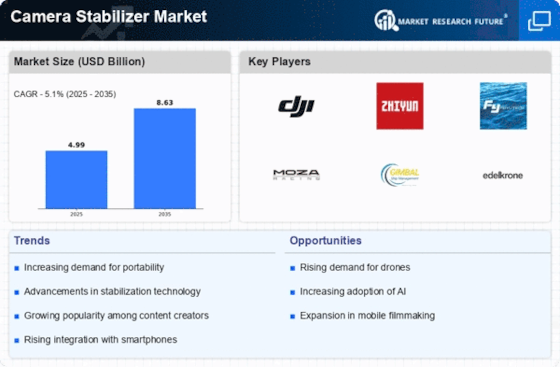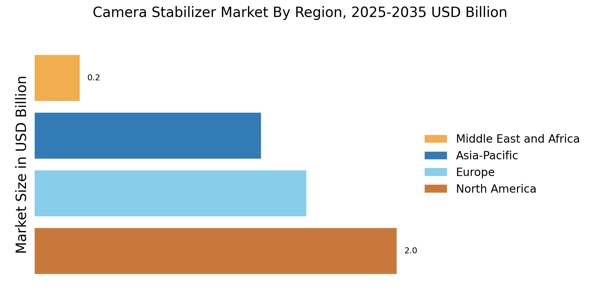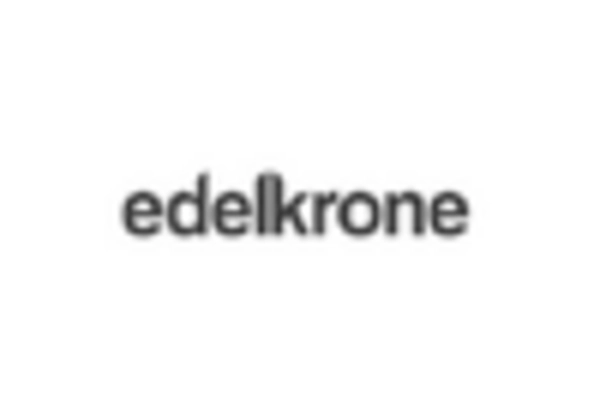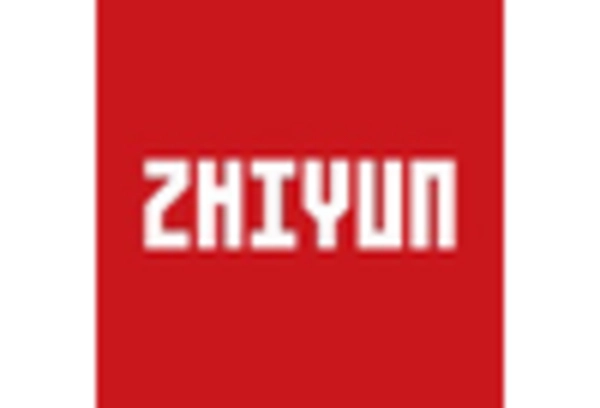Focus on Portability in Camera Stabilizer Market
Portability has emerged as a critical factor influencing the Camera Stabilizer Market. As consumers increasingly prioritize convenience and ease of use, manufacturers are designing lighter and more compact stabilizers. This trend is particularly appealing to travel filmmakers and vloggers who require equipment that is easy to transport without compromising on performance. Recent market analysis suggests that portable stabilizers are gaining traction, with sales increasing by approximately 15% in the last year alone. The demand for versatile and user-friendly products is likely to continue, as consumers seek solutions that fit seamlessly into their active lifestyles. Consequently, the Camera Stabilizer Market is adapting to these preferences, leading to innovative designs that cater to the needs of modern content creators.
Emergence of E-commerce in Camera Stabilizer Market
The rise of e-commerce platforms is transforming the Camera Stabilizer Market by providing consumers with greater access to a variety of products. Online retail has become a preferred shopping method for many, allowing customers to compare features, prices, and reviews with ease. This shift has led to an increase in sales of camera stabilizers, as consumers can now purchase high-quality equipment from the comfort of their homes. Recent statistics show that e-commerce sales in the camera accessories segment have grown by over 20% in the past year. As more consumers turn to online shopping, the Camera Stabilizer Market is likely to see continued growth, driven by the convenience and accessibility that e-commerce offers.
Rise of Content Creation in Camera Stabilizer Market
The surge in content creation across various platforms is a pivotal driver for the Camera Stabilizer Market. With the increasing popularity of social media and video-sharing platforms, individuals and businesses are investing in high-quality video production. This trend has led to a heightened demand for camera stabilizers, as creators seek to produce professional-grade content. The market data indicates that the number of content creators has doubled in recent years, further fueling the need for reliable stabilization equipment. As more people engage in video production, the Camera Stabilizer Market is poised for substantial growth. This rise in content creation not only benefits individual creators but also encourages brands to invest in high-quality promotional materials, thereby expanding the market's reach.
Technological Advancements in Camera Stabilizer Market
The Camera Stabilizer Market is experiencing rapid technological advancements that enhance the performance and usability of stabilizers. Innovations such as 3-axis gimbals and advanced stabilization algorithms are becoming increasingly prevalent. These technologies allow for smoother footage and improved user experience, which is crucial for both amateur and professional videographers. The integration of artificial intelligence in stabilization systems is also noteworthy, as it enables real-time adjustments based on movement dynamics. According to recent data, the market for camera stabilizers is projected to grow at a compound annual growth rate of approximately 10% over the next five years, driven by these technological improvements. As manufacturers continue to innovate, the Camera Stabilizer Market is likely to attract a broader audience, including filmmakers, vloggers, and content creators.
Growing Demand in the Film and Entertainment Sector of Camera Stabilizer Market
The film and entertainment sector is a significant driver of growth within the Camera Stabilizer Market. As filmmakers strive for higher production values, the need for advanced stabilization solutions becomes paramount. The industry has witnessed a notable increase in the use of stabilizers for both feature films and television productions, as they enhance the visual storytelling experience. Market data indicates that the film industry is projected to expand, with an estimated growth rate of 5% annually. This growth is likely to result in increased investments in camera stabilization technology, as production companies seek to deliver high-quality content. The Camera Stabilizer Market stands to benefit from this trend, as filmmakers increasingly recognize the importance of stabilization in achieving cinematic excellence.
















